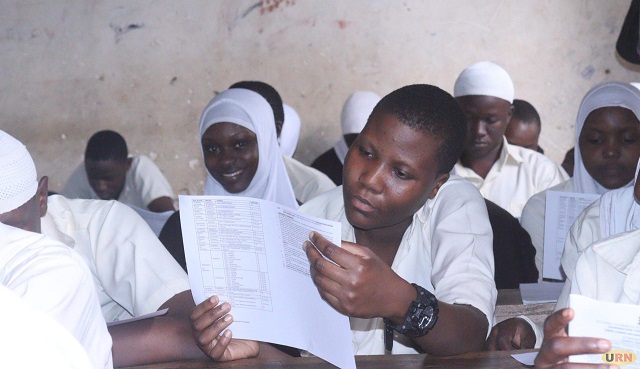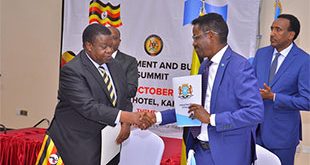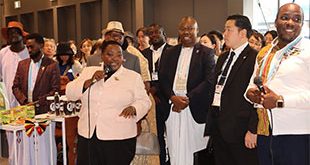
Kampala, Uganda | THE INDEPENDENT | Candidates for the 2024 Uganda Certificate of Education (UCE) examination, who are also the first to be assessed under the revised lower secondary curriculum, were briefed on Friday in preparation for their initial examination on Monday.
The Uganda National Examinations Board (UNEB) stated that this briefing is the first item on the examination timetable, providing learners with essential guidelines on the dos and don’ts of the examination, along with other important information.
Our reporters visited various schools across the country, where briefings took place in the afternoon. At Mulago High School, Hassan Gombe, the headteacher encouraged students, saying, “Don’t be afraid. This is your first paper, and you’ve already passed.”
The session began with a roll call of registered candidates, met with silence as each name was called out.
Gombe later outlined the examination rules and guidelines as other teachers present supported him, ensuring students were well-prepared for the examination.
Godfred Ssebunya, the S.4 class teacher at Mulago High School, cautioned learners about the dangers of malpractice and the use of smartphones during the examination period. He highlighted that many individuals might be sharing what they refer to as “UNEB papers” on social media and urged students not to get caught up in these distractions. “I know you have smartphones and a lot is circulating on social media, but don’t let it distract you. If you find yourself in a group where those so-called ‘busasi’ are being shared, do not reshare them, as this is also an offence. Instead, report the matter,” Ssebunya advised.
The 2021 UNEB Act makes it illegal to share materials that claim to be UNEB papers or any content related to national examinations. Section 25(1) states that anyone who gains or attempts to gain possession of any examination paper, part of a paper, or related materials commits an offence. Those convicted face penalties of up to two thousand currency points in fines, a maximum prison term of ten years, or both.
In previous years, candidates, teachers, and parents have frequently shared what they call leaked UNEB items on social media, leading to multiple arrests last year.
The misuse of social media for examination malpractice has become a growing concern within the education system, not just in Uganda but globally. Some countries have even taken drastic measures, such as temporarily blocking social media platforms during national examination days to deter cheating.
For instance, Algeria has enforced nationwide internet blocks for six years to combat widespread cheating during final exams. Meanwhile, after the briefing, Gombe expressed confidence that, despite the new curriculum and assessment format, teachers have fulfilled their roles effectively. He emphasized that they are confident candidates have been thoroughly prepared for the upcoming examinations.
Learners also shared with our reporter that they feel well-prepared for the exams. However, they admitted to experiencing some nerves and anxiety as the examination day approached.
In Moroto, Edward Okwir, the Deputy Head Teacher of Moroto Parents Secondary School, stated that they have adequately prepared candidates with the new curriculum. He mentioned that their preparations included registration, assessments, project work, activity integration, and the use of an observation checklist.
Okwir noted that the internal continuous assessments had been completed and submitted to the UNEB centre. However, the headteacher expressed frustration regarding student absenteeism, which has hindered the compilation of the observation checklist subject report. Okwir emphasized that the challenge of learners being absent has delayed essential processes leading up to the examinations.
At Mbogo College School in Kawempe, Abdu Noor Ssentamu, the head teacher, urged learners to think critically and interpret questions accurately to meet the demands of the new curriculum. Ssentamu explained that the curriculum introduces scenario-based questions that do not require uniform answers, but rather depend on each learner’s interpretation and understanding.
He noted that as pioneers of this new thematic curriculum, they may lack references since everything is starting for the first time. He also mentioned that teachers have received ongoing training to fully understand the new curriculum so they can effectively guide the learners.
At Bastion High School in Maganjo, William Mukwaya, a history teacher, remarked that the questions in the new curriculum are not as direct as they were in the old curriculum. He advised learners to read and comprehend questions thoroughly before attempting to answer them.
Mukwaya also emphasized that students should embrace research while preparing for their exams, using information from their local communities.
Frank Twinomuhweezi, a candidate at Kabale Brainstorm High School in Kabale district says that though he is very prepared to sit for exams under the new curriculum, he and other candidates at the school were challenged by research due to lack of resources.
Confidence Nayamba, another candidate at the same school says that despite being ready for the exams under the new curriculum, his worries are on the questions approach grading of marks that they are not conversant with.
Betty Birungi, a senior four candidate at St Marys College Rushoroza also in Kabale district says that she is also ready for exams set under the new curriculum.
Birungi however says that she and her fellow candidates were challenged by shallow information in the available textbooks under the new curriculum.
Honest Amutuheire another candidate at the same school says time to do extra research to prepare for UCE exams was not enough despite the shallow information in the available textbooks under the new curriculum.
In addition to the candidates registered under the new lower secondary curriculum, some students will be sitting for examinations under the old curriculum.
A total of 379,748 candidates have registered for both the new and old curriculum examinations, set to take place at 4,168 centres. Among them, 10,147 candidates are sitting for the transitional examination based on the old curriculum, while 369,601 are pioneers of the new curriculum.
Of the transitional candidates, 54.7% are female and 45.3% are male. For the new lower secondary curriculum, 50.8% of the candidates are female and 49.2% are male.
Additionally, 138,502 candidates (36.4%) are funded by the government under the Universal Secondary Education (USE) Programme, an increase from last year’s 114,200 government-sponsored candidates.
The number of privately sponsored candidates stands at 241,246. Among the candidates, 825 learners are Special Needs Education (SNE) candidates. Out of these, 38 are sitting for the transitional examination. Access arrangements have been made for all the SNE candidates to receive the necessary support for their needs.
*******
URN
 The Independent Uganda: You get the Truth we Pay the Price
The Independent Uganda: You get the Truth we Pay the Price




